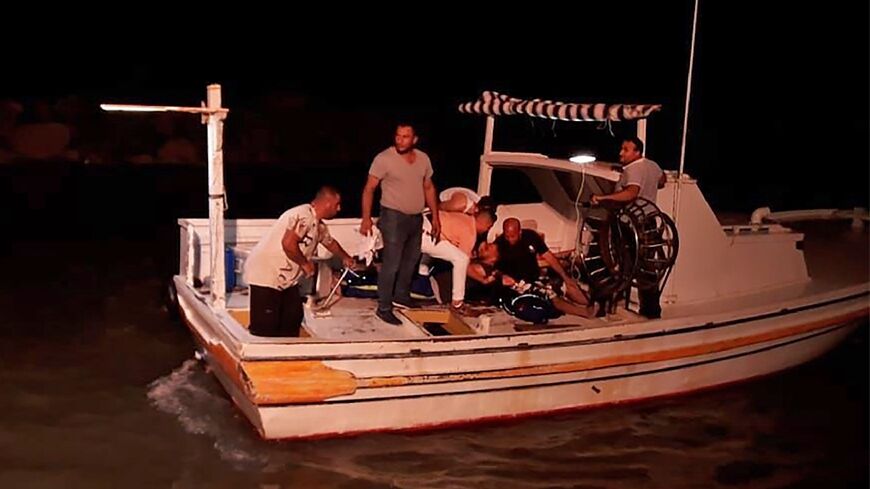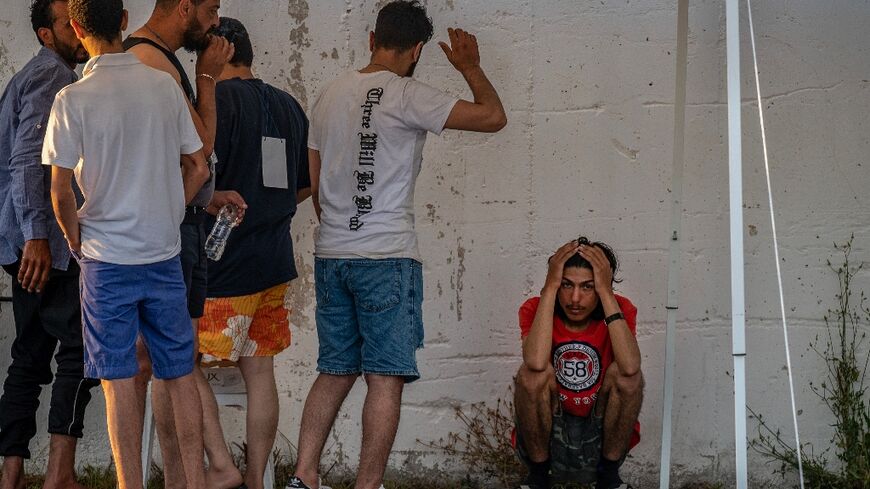Cyprus is favored route for thousands of Syrian migrants escaping Lebanon
Nearly 60 times as many people, mostly Syrians, are leaving Lebanon by boats en route to Europe when compared with last year — a number expected rise in the next few months during peak migration season.

BEIRUT, Lebanon — Over a cup of Arabic coffee in his one-room Beirut apartment, 31-year-old Ahmad al-Izzo said it has become “impossible” for Syrians to live in Lebanon.
In 2014, Ahmad fled to Lebanon from Homs in Syria, where, he says, “there is nothing left” now. Ahmad’s home was destroyed in the over 12-year-long Syrian war, which has also left the country’s economy in ruins.
In Lebanon, violence against Syrians has spiked following the killing of Pascal Sleiman, a senior official with the Lebanese Forces (LF), a right-wing Christian party. The Lebanese army said Sleiman was abducted and killed in a carjacking attempt on April 7 by Syrian gang members.
Since Sleiman’s killing, the Lebanese police and army clamped down on Syrians, closing their businesses, evicting those without residency documents and intensifying their campaign to deport them.
Ahmad’s residency papers are outdated, which is not uncommon for Syrians in Lebanon, because he has been unable to update them due to high renewal fees. This has left him terrified of deportation. “We can’t live in Syria or in Lebanon,” he told Al-Monitor.
His last hope for his wife and two young children, aged four and six, is to climb aboard a boat and attempt the dangerous passage across the Mediterranean Sea to Italy.
He is still searching for a smuggler, whom he would pay thousands of dollars to take his family across the sea.
The number of people, mostly Syrians, leaving Lebanon’s coast on boats en route to Europe has surged compared with last year.
On Thursday, the European Union announced an aid package for Lebanon of 1 billion euros — about $1.06 billion — to help Lebanon improve border control and counter the growing smuggling industry.
Between January and April 17, the United Nations’ refugee agency (UNHCR) verified 59 boats with a total of 3,191 passengers that departed from Lebanon’s shores. During the same period last year, only three boats with 54 passengers on board left Lebanon — reflecting nearly a 60-fold increase this year, UNHCR spokesperson Lisa Abou Khaled told Al-Monitor.
Abou Khaled said the “desperate journeys” were undertaken because of “the inability to survive in Lebanon due to the deteriorating economy situation, the lack of access to basic services and limited job opportunities and having relatives or community members in destination countries.”
Cyprus: Cheapest route to Europe
Four of Ahmad’s brothers recently left on boats to the Mediterranean island of Cyprus, the closest European Union (EU) member state to Lebanon and the cheapest route to Europe.
This year, the number of Syrians arriving by boat to Cyprus — many of whom are coming from Lebanon — has also increased compared with last year.
Between Jan. 1 and April 21 of this year, at least 50 boats arrived in Cyprus, compared with only 10 during the same period in 2023. Almost 3,000 Syrians submitted asylum applications in Cyprus between January and March this year, according to UNHCR figures.
One of Ahmad’s brothers, 24-year-old Hasan al-Izzo, arrived in Cyprus on March 13 after a 15-hour boat trip from the Syrian coastal city of Tartus. Hasan had been living in Lebanon but was smuggled back to Syria a few months before he departed to Cyprus.
Hasan told Al-Monitor over the phone from the southern Cypriot city of Limassol that he paid $2,800 to smugglers working under a Syrian tourist company. The advertisement for the sea journey was “the opposite” of what it was, Hasan said, describing that around 130 men, women and children were crammed onto a small fishing boat.
But once Hasan successfully arrived, three of his brothers followed in the next weeks. They all paid around $3,000 per person. One of Hasan’s brothers paid a total of $11,000 to bring his wife and two children, aged 11 and 13.
It was the second time Hasan attempted to escape Lebanon via sea. In September, 2022, Hasan attempted to go to Italy by boat, which cost him about $8,000, nearly three times the price of the trip to Cyprus.
However, half way through the trip, the boat ran out of fuel and the Cypriot coast guard returned the passengers to Lebanon.
Smugglers are often ill-prepared for the journey, leaving passengers without enough fuel and food and water supplies. Tens of thousands of people have died attempting to irregularly migrate across the Mediterranean since at least 2014, according to the Missing Migrants Project.
“I don’t want to live in Lebanon. There is so much racism [toward Syrians],” Hasan said. As for returning to Syria, he said, “I’d prefer to die in the ocean.”
Cyprus cracks down
In response to the rising numbers of arrivals of Syrian asylum seekers, Cyprus announced it would no longer process Syrians’ asylum applications on April 14 and — in coordination with Lebanon — has tightened its policing of the seas.
On April 17, Cypriot maritime police prevented five boats, which embarked from Lebanon carrying hundreds of Syrians, from reaching Cypriot waters. Alarm Phone, a hotline for migrants crossing the Mediterranean Sea to the EU, reported that the boats were trapped at sea for days between Lebanon and Cyprus without sufficient supplies.
UNHCR called on Cyprus not to violate international human rights laws or put passengers at risk during its efforts to prevent the boats from reaching the island.
As an EU member state, Cyprus is bound by the obligations relating to rescue at sea, which include the search and rescue of shipwrecked persons. Cyprus must also ensure access to the right to asylum and protection from refoulement for those who have a well-founded fear of persecution in the case of their return.
Cyprus’ crackdown on migration coincides with the EU’s approval on April 10 of a sweeping reform on Europe’s asylum and migration rules, known as the Pact on Migration and Asylum. Rights groups have denounced the reform package over some of its parts, including setting up border facilities to screen asylum seekers and extending the detention period of rejected applicants, saying that it will lead to more human rights violations against refugees.
Boats turn to Italy
Ahmad, from his small Beirut apartment, said that because of Cyprus’ crackdown, he will not be joining his brothers on the island and instead has his hopes pinned on Italy.
“Now we’re back to the old modus operandi, where most of those who leave Lebanon by sea are trying to go to Italy,” Ibrahim Jouhari, a migration researcher and co-author of a 2023 Friedrich Naumann Foundation (FNF) paper on irregular maritime migration trends from Lebanon, told Al-Monitor.
Cyprus halted the examination of Syrians’ asylum application between about 2021 and 2023 under the former Cypriot government. It wasn’t until February 2023, when the current government took their seats, that Cyprus resumed the examination of Syrian applications, according to Andreas Georgiadis, the head of the Cyprus Asylum Service of the Ministry of Interior, who shared this with Al-Monitor's correspondent during a trip to Cyprus.
And subsequently, in early 2023, more Syrians from Lebanon began arriving in Cyprus, Jouhari confirmed.
Jouhari added that the boat departures from Lebanon began to significantly pick up, coinciding with the start of the Gaza war in October 2023. He said he has noticed a rise in the numbers of Palestinians attempting boat migration from Lebanon, according to his tracking of numbers from the European Border and Coast Guard Agency (Frontex).
He also pointed to a growing trend of Syrians being smuggled into Lebanon from Syria for a few days and then embarking for Europe from the Lebanese coast. This may be due to the Syrian regime’s and Russia’s tight control of Syrian coastal cities, making it more difficult for boats to leave, he said.
Meanwhile, Jouhari pointed out that the high season for maritime migration, typically in August, has not even begun. “With the economic crisis and the limited resources, the Lebanese police force, navy and internal security will definitely be overwhelmed” as the numbers rise, Jouhari said, noting that there will likely be “more organized crime, more accidents and more casualties.”
“So it is a problem that is slated to become much worse in the next few months,” he said.
‘There’s nothing worse than Lebanon’
Out of fear of violence and deportation, Ahmad said he has not walked more than a few steps away from his apartment in the past month. “It’s impossible to leave the house,” he said.
But Ahmad’s limited mobility and fear are not his major concerns. He said he’s mostly worried about his children’s futures.
Ahmad and his wife, Fatima, decided it was better to keep their 6-year-old daughter home from school this year than to send her to the Lebanese public schools’ afternoon shifts for Syrian students — where they have heard terrible stories about how the students are treated.
“The most important thing is my children’s education,” 25-year-old Fatima, who also fled Syria, told Al-Monitor.
Fatima said she is scared to board a boat with her children to Italy, but she sees no other option to give her children a chance at a better future. “Of course I’m scared, but what should I do? There’s nothing worse than here [Lebanon].”






